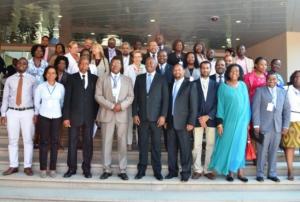Academics and experts discuss public health in Mozambique
Maputo, October 6, 2014 - Experts, academics, senior staff from the Government and partners in the health sector recently participated in Maputo, in the 1st National Meeting of Public Health to analyze the situation of Public Health in Mozambique and define actions to improve health status of populations.
The Acting Representative of the World Health Organization (WHO) in Mozambique, Dr. Jacob Mufunda, took part in the three day event and shared his experience on the control of Ebola in Sierra Leone with the provincial’s medical chiefs and other senior public health expert.
The main issues discussed during the meeting were:
The Determinants of Health: Public Health in Mozambique, where we want to go;
Public Health and Environment;
International Health (International Health Regulation);
Epidemiological Surveillance and Response;
Public Health Law and
Primary Health Care
Key Recommendations
Need to conduct research on aspects related to the Social Determinants of Health, because the determinants play a major role in defining the epidemiological and demographic profile of countries;
Integration of the approach "Health in All Policies" and formulation, implementation and evaluation of policies and health services;
Deepen the knowledge of the magnitude and trends of the impacts of environmental degradation and climate change on human health;
Concerted and simultaneous implementation of measures for the improvement of sanitation, access to water supported by rigorous implementation of instruments of territorial planning in cities, towns and villages;
Improve some key aspects for the implementation of the International Health Regulations, as well as the massive spread of this Regulation;
Document the impact of an intervention, and monitor progress toward program goals;
Monitor or clarify the epidemiology of health problems, to allow the definition of priorities and policy / public health strategies;
The proposed Public Health Act should be comprehensive with specific regulations for each area;
The system of public health surveillance should be revised in the face of demographic transition, epidemiological changes and areas of economic development.
There was consensus that the epidemiological surveillance and response had earned a renewed national, regional and global attention due to emerging diseases and Mozambique recorded significant growth in its capacity for surveillance and response.
Participants received information about the deep origins of Primary Health Care, including the well-known WHO Declaration of Alma-Ata on Primary Health Care and the World Health Report 2008. Both in the Declaration in 1978 and in the World Report 2008, health is underpinned by the principles of social justice, equity and solidarity.
It was found that the level of the WHO African Region, Mozambique was pioneering and successful implementation of the Primary Health Care during the post-independence period.
Participants also recalled the sense of taking into account the transition from the standard epidemiological pattern, especially with the double burden Communicable Diseases and Non-communicable Diseases.
In the end everyone congratulated the Ministry of Health for having organized this important meeting, which discussed current and important aspects of Public Health in Mozambique.
end /
Para informações adicionais, por favor, queira contactar : Telefone : 258- 21492733 ou moreirag [at] who.int
